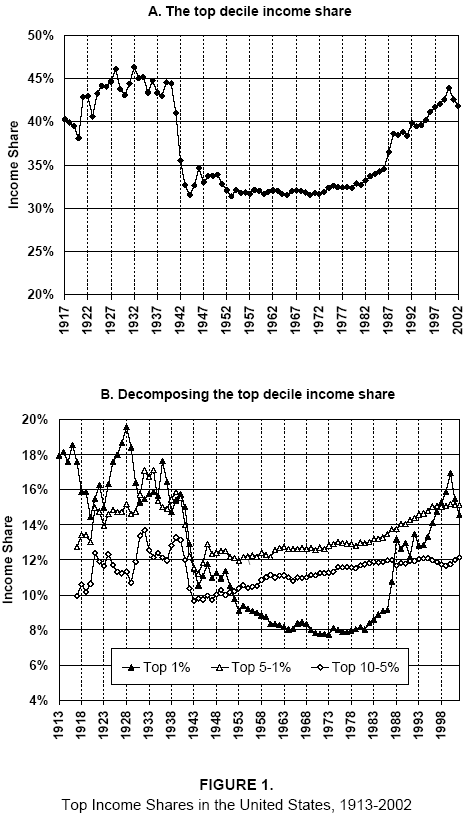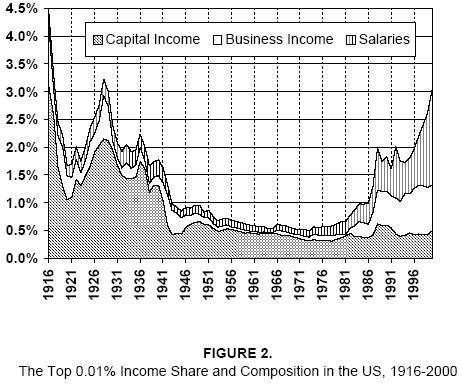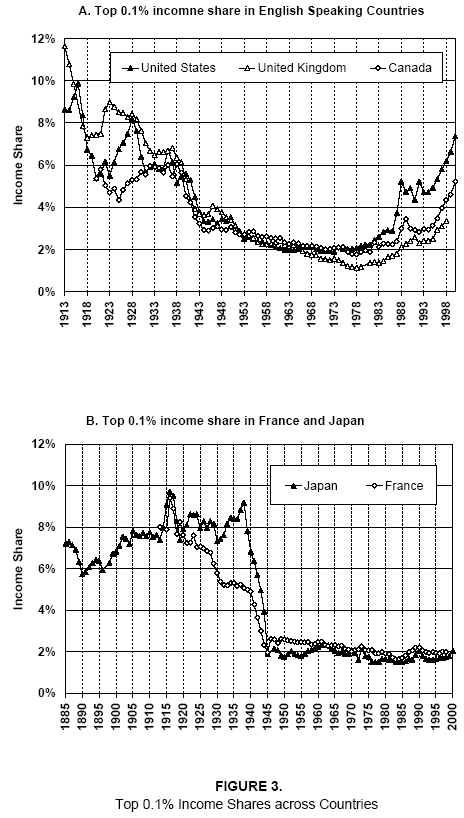«
Best Science Available? | Main
| Greenspan
Opposes Wal-Mart's Banking Plans »
January 25, 2006
The Evolution of Top Incomes
I haven't had a chance to read this yet, but I hope to:
The Evolution of Top
Incomes: A Historical and International Perspective, by Thomas Piketty
and Emmanuel Saez, NBER WP 11955, January 2006: Abstract
This paper summarizes the main findings of the recent studies that
have constructed top income and wealth shares series over the century
for a number of countries using tax statistics. Most countries
experience a dramatic drop in top income shares in the first part of
the century due to a precipitous drop in large wealth holdings during
the wars and depression shocks. Top income shares do not recover in
the immediate post war decades. However, over the last 30 years, top
income shares have increased substantially in English speaking
countries but not at all in continental Europe countries or Japan.
This increase is due to an unprecedented surge in top wage incomes
starting in the 1970s and accelerating in the 1990s. As a result, top
wage earners have replaced capital income earners at the top of the
income distribution in English speaking countries. We discuss the
proposed explanations and the main questions that remain open.
Here are some figures from the paper:
For United States of America:
(A and B)



Posted by Mark Thoma on January 25, 2006 at 04:34 PM
in Academic
Papers, Economics,
Income
Distribution | Permalink
TrackBack
TrackBack URL for this entry:
http://www.typepad.com/t/trackback/4127128
Listed below are links to weblogs that reference The
Evolution of Top Incomes:
» L'évolution
des hauts revenus en trois schémas from LE BLOG D'ECONOCLASTE
Voici le premier, qui met en évidence la part du revenu national reçue
par les 0.1% les plus riches aux USA, Grande-Bretagne, et Canada... [Read
More]
Tracked on Jan 26, 2006 12:18:31 PM
Comments
Thanks for this post - those are absolutely fascinating graphs.
Posted by: RN
| Jan 25, 2006 8:19:44 PM
I'd be fascinated to see Australia's plot since they suffer from many
Anglo-Saxon afflictions but have a far more rabid "fisc" with
teeth than US UK or Canada. Germany and the nordics would also be
instructive by way of comparison - especially Sweden where egalitarian
as one might think they are, concentration is high.
Posted by: Robert
| Jan 26, 2006 6:31:20 AM
great stuff, thx.
Posted by: bailey
| Jan 26, 2006 10:43:28 AM
Robert,
I agree Sweden and Australia would be interesting, but together with
other countries who did not suffer from WWII : Switzerland, Argentina,
Portugal.
Or countries who suffered big times in other years: Spain, Lebanon...
Posted by: LE
passant du sans-souci | Jan 26, 2006 11:54:07 AM
I wonder whether, for example, the French and Japanese are lagging
more in the Letter of the Stats than the Spirit of the Stats due to tax
regulations that make it incumbent upon the rich (who wish NOT to be
redistribution statistics) to keep their potential income in their
tax-advantaged holding companies or listed vehicles and let their value
roll up there, rather than take it as salaried income or dividends. For
once taken, the I believe the French will assess an annual "wealth
tax" in addition to ordinary income tax that perhaps disadvanatges
one from taking excess income or dividends, in fact. It may be more
advantageous to keep wealth in corporate structures, and use the
corporate perks for quality of life things, thus hiding the true data
from the stats (and the State). The wealthy there, are, in effect,
"asset rich" and "cash poor", or at least
disincented from taking any more cash than what they "need"
for their lifestyle.
Also French and Japanesse shares lagged recoveries in Anglo Saxon
countries and on emight expect these numbers probably began to turn up
in earnest in 2004 and 2005.
Finally, Australia is interesting because I believe disincentives to
taking money out of a company are neutralized because it is my
understanding that Australian tax policy effectively "marks ones
assets to market" thus taxing one upon the increase in value of
assets - apparently because the State views the tax deferral on the
increase in "wealth" as a free loan from the State. Can anyone
confirm this?
Posted by: Robert
| Jan 26, 2006 12:44:30 PM
Recent Posts
Recent Comments
Email and Links
Graph Archive
Blogs
UP - Updated within 3 hrs
Disclaimer
The views expressed on this site are my own
and do not necessarily represent the views of the Department of
Economics or the University of Oregon.
Blog Established
March 6, 2005